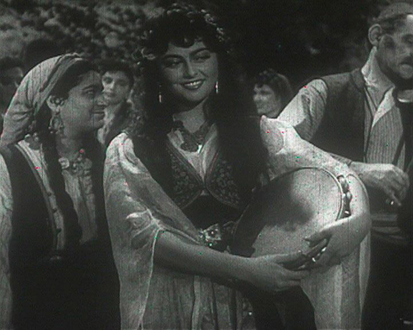
I just went to some presentations in the context of the Collaborative Online Video project, organised by the Brussels based collective Constant (more about that later, perhaps). During the discussions afterwords, Seda Gürses mentioned an interesting documentary, Whose Is This Song? (2003) by Bulgarian filmmaker Adela Peeva, as a starting point to think about issues of ownership and accountability in a collaborative context.
The film documents a journey through the Balkans to unearth the origins of a melody the filmmaker heard during a dinner party. At the dinner table, where she, herself Bulgarian, was with a Greek, a Serb, a Turk and a Macedonian, it became apparent that they all knew the words and could sing along – in their own language. The question arose: whose song is it? They couldn’t agree on its origin, so Peeva set out to make a documentary about her journey across the Balkans to discover where the song really came from. In the documentary, the song itself “transforms” as it moves through the Balkans (from Bulgaria to Turkey, Greece, Albania, Macedonia, Bosnia, Serbia, and back to Bulgaria), from love song to military march to religious hymn to revolutionary anthem. It’s about a beautiful gypsy woman who stole the hearts of the town’s men; it is sung by the marching armies of Islam as they spread their religion into the region; it’s in celebration of a local festival day. Each group claims the song as its own, insisting that only they could have composed such a beautiful piece. Through the twists and turns of the filmmaker’s quest, the Balkan peninsula reveals its diversity and the wealth and power of its traditions.
The film also speaks about the complex and sensitive political situation in the balkan region. At the end of the film there’s a scene in which Peeva plays the Bosnian version of the song for a pub filled with Serbians. At first they are silent, but then the place explodes with anger. They accuse her of being a troublemaker, attempt to smash her camera and threaten physical violence. The idea of her playing them the enemy’s “theft” of their beloved song, which was doubly insulting to them because the Bosnian version was a jihad song, and they were all Orthodox Christians. The song dredged up lingering hatreds from a decade of war in neighboring Bosnia. At a St. George’s Day festival in Bulgary, Peeva tells a group of teenagers that some people say their beloved song originated with the Turks—this immediately after they brag that they’d like to slit the throats of any Turks they see. Unsurprisingly, people get pissed off. Word gets out that she’s a “Turk-lover”, and the people turn on her, despite their shared nationality. One man threatens to hang her from a nearby oak tree. Again, she inadvertently dredged up long-held animosity, this time going back to the fall of the Ottoman Empire. The film isn’t really about who the song originated with, though; it’s about how the song as cultural commodity is used in the service of nationalism. In the finale, as the Bulgarians attempt to put out a fire started by fireworks (a fire that likely saved Peeve’s hide), the filmmaker despairs of there ever being peace in the Balkans.
Here’s a trailer for the film:
The melody obviously made its way out of the balkans too. Listen for example to Boney m’s ‘rasputin’:
I was told there are versions in jiddish as well.
The entire film is on YouTube (badly compressed)
Part 1:
Part 2:
Part 3:
Part 4:
Part 5:
Part 6:
Part 7: